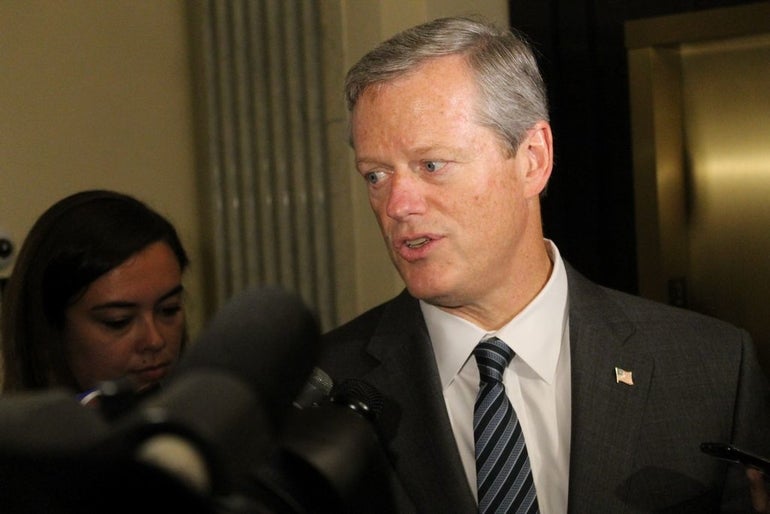Baker pursuing state, federal drug purchasing reform
 Photo/SHNS
Gov. Charlie Baker
Photo/SHNS
Gov. Charlie Baker
Gov. Charlie Baker's administration is preparing to roll out a proposal to allow the state to negotiate prices directly with drug manufacturers and possibly hold price hearings as he seeks to curb what he called "the single biggest driver, at this point, to the rising cost of health care in Massachusetts."
Health care spending in Massachusetts rose 1.6 percent to $61.1 billion in 2017, according to the Center for Health Information and Analysis. Prescription drug spending climbed 5 percent to $9.7 billion in 2017 and is one of two main drivers of cost growth, along with hospital outpatient spending, CHIA said.
Baker told the Health Policy Commission on Tuesday that his administration is pursuing drug purchasing reform at the federal level but is also "actively reviewing the work of other states as we develop proposals that we'll roll out in the near future regarding direct negotiation with manufacturers that could include price hearings and formulary restrictions in certain circumstances while ensuring strong consumer protections."
Baker has made a similar proposal before and the Senate's initial fiscal 2019 budget included language allowing the state to negotiate drug prices directly with manufacturers. Since then, the Centers for Medicare and Medicaid Services (CMS) in late June rejected a waiver request from Baker, which he had hoped would help control rising pharmacy costs.
Trish Riley, executive director of the National Academy for State Health Policy, testified Wednesday that other states looking to control prescription drug costs were "keenly interested" in the Baker administration's pharmacy spending waiver request.
"I think all eyes are on Massachusetts to see what your next steps will be," she said at a packed Health Policy Commission meeting held Wednesday at Suffolk University Law School.
When CMS rejected the waiver, disappointed Baker administration officials said they remained committed to finding state-based solutions to reduce the growth in drug spending while maintaining access to necessary medications.
CMS would not consider the pharmacy waiver without the state withdrawing from the federal Medicaid Drug Rebate Program (MDRP) and eliminating pharmacy as an optional Medicaid benefit, according to administration officials. State officials said it was critical to remain in the drug rebate program since it's the foundation for $900 million in rebates received annually by MassHealth, of which more than $550 million is returned to CMS.
At Wednesday's meeting, Riley said it's difficult to determine what is a fair price for drugs.
"These are emotional issues in the states," Riley said. "They're drugs people very much need and want. They're innovative, exciting. Companies are doing great work. But the prices are out of control. That is the million-dollar question about what is a fair and appropriate rate of return."
States are exploring price gouging bills, bills limiting how much states pay for drugs, treating drugs like "public goods" from a regulatory perspective, and importing prescription drugs at the wholesale level from Canada, "where prices are significantly lower than they are here for the same drugs."
"This is not personal importation, where there have been some problems," Riley said.
State legislatures are also giving a closer look to bills outlawing a "gag clause" that prevents pharmacists from telling consumers when there are cheaper prescription drug alternatives available, according to the national academy. To address possible unfair trade practices, some of the bills also require fuller disclosure about business relationships between pharmacy benefit managers, health plans, and pharmacies.
Medicaid drug spending in Massachusetts has doubled to $2 billion over five years, driven "primarily by high-priced drugs, some over a million dollars a year per member," Baker said.
"Thirty drugs account for $600 million, or 30 percent of our total pharmacy spend at this point," Baker said Tuesday. "These high-cost drugs have no competition in the marketplace making it virtually impossible for any state's Medicaid program to negotiate a reasonable price."
He said Tuesday that his administration has "maximized what we consider to be sort of all available strategies under our current statutes by utilizing the levers we have" and is re-working the federal waiver.
Medicaid initiatives aimed at controlling drug costs are "terribly important" for states, which must cover the significant tab associated with low-income, elderly and disabled individuals who depend on the program and often "use a great number of drugs," Riley said.
A "grand bargain" struck decades ago between the federal government and the industry featured significant industry rebates at the federal level and supplemental rebates at the state level in exchange for every drug being offered on the states' formularies.
State officials are often told by the federal government that they are each receiving the best supplemental rebate, but only the federal government knows what the rebates look like, said Riley.
"It's a black box. We don't know," she said. "CMS knows, but it's a tough place to negotiate as Massachusetts has found."









0 Comments